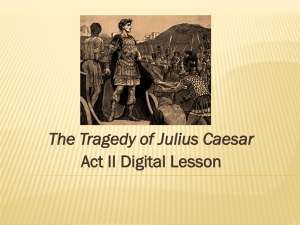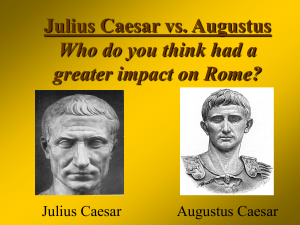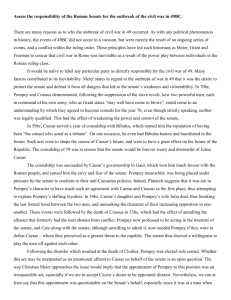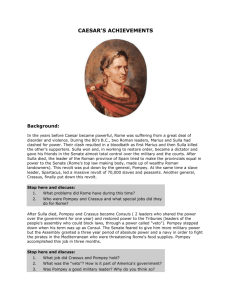Background Notes for The Tragedy of Julius Caesar by William
advertisement
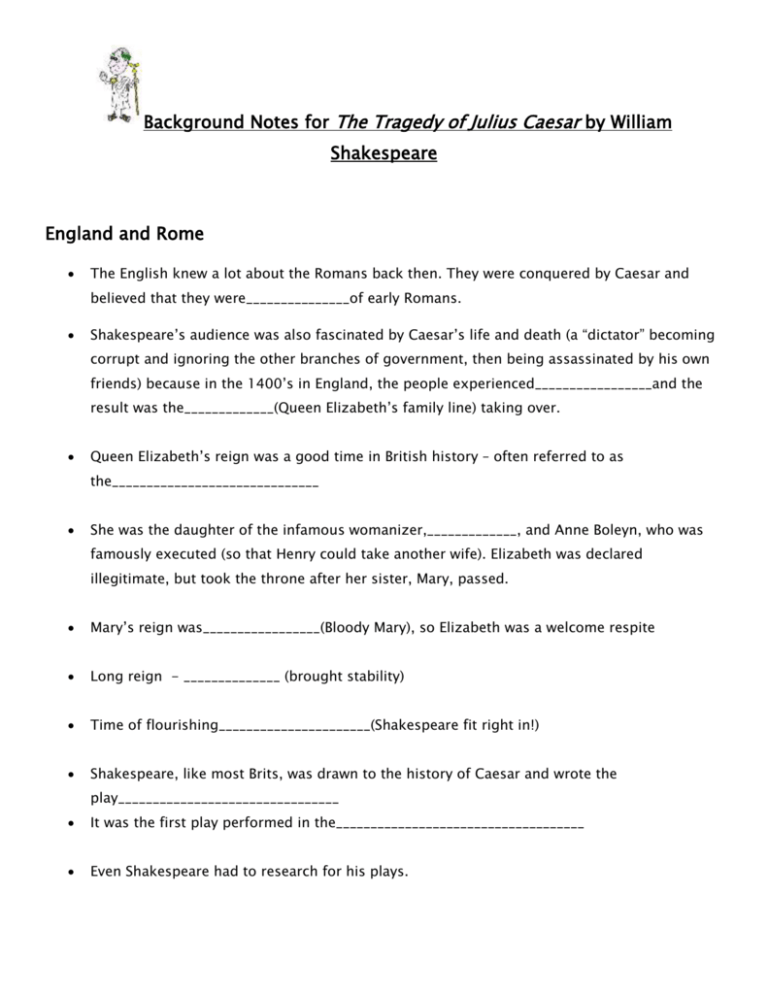
Background Notes for The Tragedy of Julius Caesar by William Shakespeare England and Rome The English knew a lot about the Romans back then. They were conquered by Caesar and believed that they were_______________of early Romans. Shakespeare’s audience was also fascinated by Caesar’s life and death (a “dictator” becoming corrupt and ignoring the other branches of government, then being assassinated by his own friends) because in the 1400’s in England, the people experienced_________________and the result was the_____________(Queen Elizabeth’s family line) taking over. Queen Elizabeth’s reign was a good time in British history – often referred to as the______________________________ She was the daughter of the infamous womanizer,_____________, and Anne Boleyn, who was famously executed (so that Henry could take another wife). Elizabeth was declared illegitimate, but took the throne after her sister, Mary, passed. Mary’s reign was_________________(Bloody Mary), so Elizabeth was a welcome respite Long reign - ______________ (brought stability) Time of flourishing______________________(Shakespeare fit right in!) Shakespeare, like most Brits, was drawn to the history of Caesar and wrote the play________________________________ It was the first play performed in the____________________________________ Even Shakespeare had to research for his plays. His main source for Julius Caesar was_________________--a Greek philosopher who lived around 45-130 A.D. The Roman Life Rome was ruled by a_______________________ (a coalition of three men) Pompey: a _______________________________________(married to Julia, Caesar’s daughter) Crassus: the____________________ man in Rome Caesar: the famous__________________ In 54 B.C. Caesar’s daughter, Julia, dies. Because she was the the only real personal tie between Pompey and Caesar, tensions flare between the two men. In 53 B.C. Crassus dies… This ends the First Triumvirate and sets______________________________against one another The Senate supported_____________________and he becomes sole consul (like a president) in 52 B.C. Caesar, on the other hand becomes a military hero and a champion of the people. He was the commander in_________________________________and had planned on becoming consul when his term in Gaul was up. (Terms were for one year.) The senate feared him and wanted him to give up his army. Caesar writes the senate a letter in 50 B.C. and says he will give up his army if Pompey gives up his. This, of course, makes the senate angry and they demand that Caesar disband his army at once or be declared_______________________________. Legally, however, the senate could not do that. Caesar was entitled by law to keep his army until his term was up. Two_______________________(an official/representative)--Marc Antony and Quintus Cassius Longinus--faithful to Caesar, veto the bill and were therefore expelled from the senate. They flee to Caesar; the men ask the army for support against the senate. The army called for action and on January 19, 49 B.C. Caesar___________________________into Italy…Civil war has begun. To sum it up, Caesar chases Pompey all the way to Egypt and “defeats” him. (He is actually assassinated by an officer of the king of Egypt) He gets a little sidetracked and hangs out with Cleopatra for a while… When he returns to Rome, he is now the____________________________and _________________________________ The play begins on_________________: The Feast of the_________________ What is that? The Romans worshipped the fertility god,_____________. They would sacrifice goats and a dog. The goats’ blood would be smeared on the foreheads of two young men, then wiped off with wool dipped in milk. Then young men wearing only strips of goatskin around their loins, ran around the city striking women with__________________________. It was believed that pregnant women would have an easier labor and infertile women would become fertile. Julius Caesar is warned to beware the ides___________________. “Ides” means the middle of the month; he was warned that something bad would happen on _______________________________. He is, in fact, killed on March 15th.
